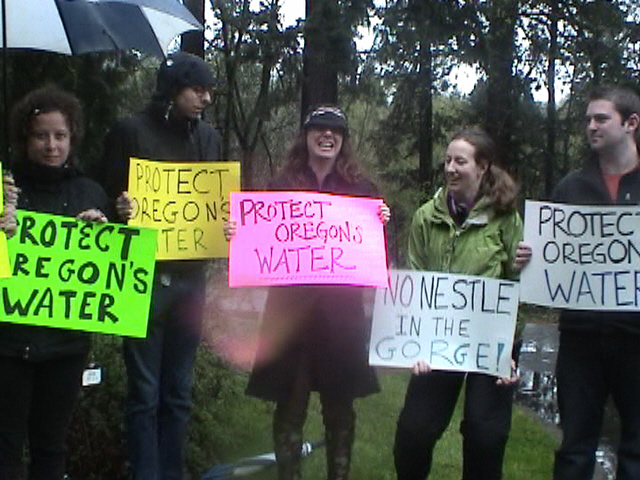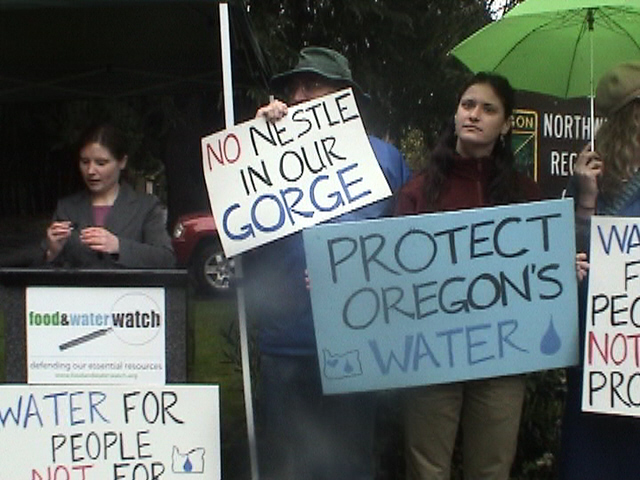Campaign to Prevent Proposed Nestle Water Bottling Facility in Cascade Locks
On Monday, March 29, 2010, Keep Nestle Out of the Gorge,
a coalition of environmental and social justice organizations led by the consumer advocacy group Food & Water Watch, launched a coordinated campaign to prevent Nestle Waters North America from opening a water bottling facility in Cascade Locks.



Rick Swart, accepting the 4000 petitions for Oregon Department of Fish and Wildlife

(Report compiled in part from Food and Water Watch Media Packet)
The coalition gathered at the Oregon Department of Fish and Wildlife (ODFW) offices to speak out against the plant, and to then deliver petitions to the ODFW signed by 4,000 Oregonians who oppose the proposed facility.
Nestle has asked ODFW to approve an agreement that would exchange part of ODFW's water rights at Oxbow Springs with an equivalent amount of well water from the City of Cascade Locks. Nestle would then buy both the city's well and spring water to bottle under its Pure Life and Arrowhead labels.
Though the financial details of the deal are not clear, Nestle has paid an average of $.oo224 per gallon in other areas where it has brokered similar deals. A gallon of Nestles spring water sold in a sing-server containers sells for $5.30.
In this agreement, Nestle would pump an average of 13.88 million gallons of water a month, a proposition that worries many.
While Nestle has cited the creation of 53 new jobs as a potential outcome of the proposed water bottling facility, some question the quality and safety of the positions. A report released last year by Food and Water Watch found that bottled water workers earn $10,000 less than their counterparts in other manufacturing jobs, and that the injury rate is 50% higher.
Keep Nestle Out of the Gorge also opposes the plant because it would increase traffic and pollution to an ecologically sensitive area and could endanger wildlife. W water bottling facility would introduce up to 210 trips a day to rural roads, potentially damaging the Gorge's scenery and negatively affecting tourism in the area.
Keep Nestle Out of the Gorge opposes the deal because a bottled water facility would lead to the commodification of Oregon’s public water resources, and potentially jeopardize local wildlife, especially native salmon and steel head species.
Keep Nestle Out of the Gorge is a local coalition led by Food & Water Watch including Alliance for Democracy; Bark; Cascadia Wildlands Project; Columbia Riverkeeper; Community for Earth; First Unitarian Church of Portland; Environment Oregon; EJAG of the First Unitarian Church in Portland; Green Sanctuary; Unitarian Universalist Church of Eugene; Gifford Pinchot Task Force; Native Fish Society; Oregon Citizens for Safe Drinking Water; Sierra Club; and Trout Unlimited, Oregon Council.
The Press Conference was moderated by Julia DeGraw, Northwest Organizer, Food & Water Watch, who after a few remarks introduced Brett VandenHeuvel, Executive Director, Columbia Riverkeeper.
The 4000 petitions were accepted for Oregon Fish and Wildlife by Rick Swart, Public Information Officer for the agency. Swart stated that "they too were concerned about the quality and quantity of Oregon's water, and that they would not make a decision that would in any way degrade or diminish this local water supply."
Swart further stated that the "decision is still a ways out, and I have a lot of faith that we'll make the decision based on sound science."
The coalition gathered at the Oregon Department of Fish and Wildlife (ODFW) offices to speak out against the plant, and to then deliver petitions to the ODFW signed by 4,000 Oregonians who oppose the proposed facility.
Nestle has asked ODFW to approve an agreement that would exchange part of ODFW's water rights at Oxbow Springs with an equivalent amount of well water from the City of Cascade Locks. Nestle would then buy both the city's well and spring water to bottle under its Pure Life and Arrowhead labels.
Though the financial details of the deal are not clear, Nestle has paid an average of $.oo224 per gallon in other areas where it has brokered similar deals. A gallon of Nestles spring water sold in a sing-server containers sells for $5.30.
In this agreement, Nestle would pump an average of 13.88 million gallons of water a month, a proposition that worries many.
While Nestle has cited the creation of 53 new jobs as a potential outcome of the proposed water bottling facility, some question the quality and safety of the positions. A report released last year by Food and Water Watch found that bottled water workers earn $10,000 less than their counterparts in other manufacturing jobs, and that the injury rate is 50% higher.
Keep Nestle Out of the Gorge also opposes the plant because it would increase traffic and pollution to an ecologically sensitive area and could endanger wildlife. W water bottling facility would introduce up to 210 trips a day to rural roads, potentially damaging the Gorge's scenery and negatively affecting tourism in the area.
Keep Nestle Out of the Gorge opposes the deal because a bottled water facility would lead to the commodification of Oregon’s public water resources, and potentially jeopardize local wildlife, especially native salmon and steel head species.
Keep Nestle Out of the Gorge is a local coalition led by Food & Water Watch including Alliance for Democracy; Bark; Cascadia Wildlands Project; Columbia Riverkeeper; Community for Earth; First Unitarian Church of Portland; Environment Oregon; EJAG of the First Unitarian Church in Portland; Green Sanctuary; Unitarian Universalist Church of Eugene; Gifford Pinchot Task Force; Native Fish Society; Oregon Citizens for Safe Drinking Water; Sierra Club; and Trout Unlimited, Oregon Council.
The Press Conference was moderated by Julia DeGraw, Northwest Organizer, Food & Water Watch, who after a few remarks introduced Brett VandenHeuvel, Executive Director, Columbia Riverkeeper.
The 4000 petitions were accepted for Oregon Fish and Wildlife by Rick Swart, Public Information Officer for the agency. Swart stated that "they too were concerned about the quality and quantity of Oregon's water, and that they would not make a decision that would in any way degrade or diminish this local water supply."
Swart further stated that the "decision is still a ways out, and I have a lot of faith that we'll make the decision based on sound science."




